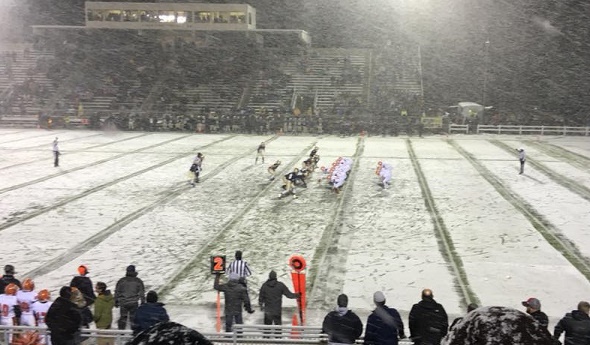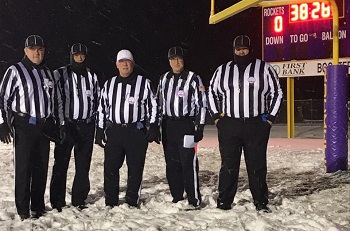
Not Just Another Season for Watson
May 3, 2018
By Cody Porter
NFHS High School Today
A 32-second response by emergency medical technicians was the difference in life or death for 68-year-old Willie Watson, who was spared from becoming another victim of sudden cardiac arrest.
Watson, a 38-year official for the Michigan High School Athletic Association, collapsed in the tunnel near the officials’ locker room after the Division 6 Football Final at Ford Field last Nov. 25 in Detroit. Fortunately for the Kalamazoo native, stadium staff members were steps away as he fell unconscious. Within seconds, their call for help reached on-site EMTs who swiftly made their way to him from the field.
“It was strange because I wasn’t sick or anything. I drove to the game by myself. Everything was fine, got dressed, and then went out on the field for the game,” Watson said. “After the game, I came to the locker room, had a boxed lunch, and the last thing I remember is leaving towards the tunnel. That’s the last thing that I remember. I woke up in the hospital the next day, on Saturday.”
Moments before Watson’s dire situation occurred, he stood in the officials’ locker room speaking with Mark Uyl, the MHSAA assistant director who coordinates officials. Uyl said when he received the call regarding Watson, he arrived to find paramedics administering full CPR, in addition to using an automated external defibrillator (AED).
“It was a scene right out of a movie,” Uyl said.
After about 10 minutes of work on Watson, Uyl said paramedics found a pulse and promptly transported him to Detroit Medical Center.
“Things were very critical that Friday night – very touch and go,” Uyl said. “Overnight we got reports that he was slowly improving.”
An implantable cardioverter defibrillator (ICD) was placed in Watson’s chest. The pager-sized device is battery powered and placed below the skin to monitor heart rate, according to the American Heart Association. If an abnormal heart rhythm is discovered, the ICD delivers an electric shock to restore a normal heartbeat.
“I got to witness an absolute miracle,” Uyl said. “If the cardiac situation doesn’t happen literally at the feet of the medical staff that we have on-site at an event like that, he would’ve gotten up to the concourse or, heaven forbid, outside the building into the parking lot or his car and I believe it would’ve been a much more tragic ending.”
Watson was working the third game of the day as a line judge, and when he collapsed, was beginning to leave the facility and head to a local hotel reserved for MHSAA officials. Uyl told Watson how much of a blessing it was that he was assigned that game. At home or at the hotel, Watson would have been alone without access to proper medical attention.
“Certainly, where we got lucky is where he collapsed,” Uyl said. “We have emergency procedures, but when we’re at one of our college or pro venues, we often use the building’s plan. It could not have been more seamless between our staff and the Ford Field building personnel.”
At MHSAA events, such as those at Ford Field, an ambulance and two EMTs are stationed on the field next to the tunnel that connects it to the other areas of the stadium. Watson said he and fellow officials routinely confirm the location of emergency responders before starting a game.
“Schools almost always have somebody from a university around who does training. Most schools have ambulance service there at the site,” Watson said. “There have been incidences where we have had injuries that require them to come out onto the field to assist a student-athlete. It could be a concussion, a leg injury or who knows. We always have somebody at a venue.”
Equipped with his ICD, Watson left for home a week later from Detroit Medical Center. Expecting to make a full recovery, Watson said the only recommendations from his doctors were to tweak his diet and increase exercise. Although he said his recovery is on track, one of the most notable effects from his incident was memory loss.
“The strange thing is that I cannot remember a single thing about the game. I can’t remember anything,” Watson said. “If you ask me what Ford Field looked like now, I couldn’t tell you. I lost my short-term memory. I remember everything except the game. It’s those 48 minutes that I can’t remember.”
An official in basketball, softball and volleyball as well, staying active won’t be too much of an issue for Watson, who said he took last basketball season off to get himself better prepared for the softball season.
“It’s just amazing how quickly they responded in my situation. Regardless of who it is, the response time I received was tremendous,” Watson said. “I was out. They had to revive me. It only took them 32 seconds to get to me. Even if it’s an injured player on the field, response times are getting so quick.”
PHOTO: Official Willie Watson signals a touchdown during the 2016 MHSAA Division 6 Final at Ford Field.

The Official View: Winter Wonderland
By
Brent Rice
MHSAA Assistant Director
November 12, 2018
By Brent Rice
MHSAA Assistant Director
In this week’s “Official View” we explain the important of insurance and offer a brief primer on how the MHSAA helps officials stay covered.
 We also work through some rule scenarios in football, volleyball and swimming and take a look at a few of the wintery scenes braved not only by teams on the field and fans in the stands but officials in stripes as well.
We also work through some rule scenarios in football, volleyball and swimming and take a look at a few of the wintery scenes braved not only by teams on the field and fans in the stands but officials in stripes as well.
It’s Official!
Most officials will go their entire lives without needing to utilize insurance coverage for something that occurred while officiating. In the often rough-and-tough world of school sports, though, the need for officials to protect themselves on and off the field has never been greater. While officiating is not considered a dangerous avocation, officials should prepare themselves for those one-in-a-million situations.
There are a variety of coverage options out there for officials, ranging from medical and loss of income coverage due to injuries sustained while officiating to liability coverage and legal fees. Officials, individually and through their associations, can purchase increased coverages that suit their needs.
The MHSAA continues to look out for the best interests of our registered officials in this area and in other ways. When officials annually register with the MHSAA, they are included in both a comprehensive liability plan and catastrophic medical coverage for incidents that occur during MHSAA contests. Major injuries due to officiating are rare, but it is nice to have the security that you’re covered in the event of some tragic event. Though the few lawsuits that officials are a party to are often summarily dismissed, the MHSAA’s liability coverage kicks in at dollar one, including any legal fees or attorney retainers.
We will be seeking your feedback in how we can best serve these interests as they pertain to increased insurance coverage, training and development and providing additional useful resources. We thank you for your input and continued commitment and dedication to the MHSAA and the Officials Program.
Rule of the Week
FOOTBALL It’s 4th-and-8 on Team K’s 35-yard line. R1 signals for a fair catch at Team R’s 40-yard line. R1 muffs the punt, and the ball is picked up by K5 at Team R’s 35. With no one else around, K5 runs into his end zone for an apparent touchdown.
Ruling: The ball is dead at the moment the muffed kick is possessed by Team K. The ball cannot be advanced. It will be 1st-and-10 for Team K on R’s 35.
It’s Your Call
VOLLEYBALL This week’s clip shows a back row player for Team S making a back row attack and then landing on the attack line. What’s the call?
Last Week’s IYC Ruling: Last week’s video shows a swimmer drifting into the lane divider before ultimately finishing first in the meet. This incidental contact with the lane divider is legal since she did not grab ahold or otherwise use the divider to pull herself through the water. (Click to see last week's video.)
Official View: Reffing in a Winter Wonderland
The first day of winter is scheduled for Dec. 21, but you wouldn’t know that by the weather from this past weekend’s football games.
 Snow covered most of the state Friday and Saturday, even causing some teams to play in a couple of inches of the falling white stuff. Just like our teams, the officials braved the cold and flurries to ensure another great week of MHSAA football.
Snow covered most of the state Friday and Saturday, even causing some teams to play in a couple of inches of the falling white stuff. Just like our teams, the officials braved the cold and flurries to ensure another great week of MHSAA football.
The top photo shows Thirlby Field during the Division 6 Regional Final between Traverse City St. Francis and Kingley.
The photo above and to the right is from the 8-Player Semifinal between host Rapid River and Cedarville. The crew, from left: Joel Mitrzyk, Mark Pieniozek, Jan Viliquette, Paul Binder and David Paananen.

